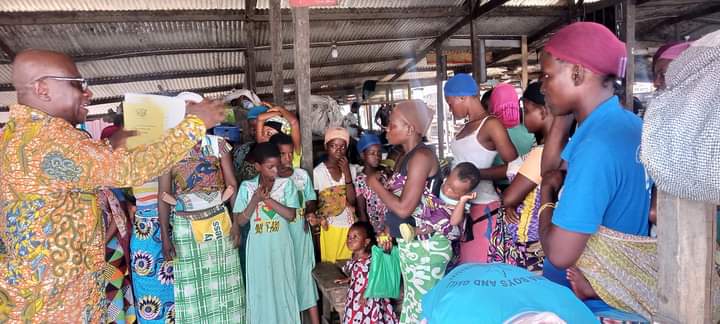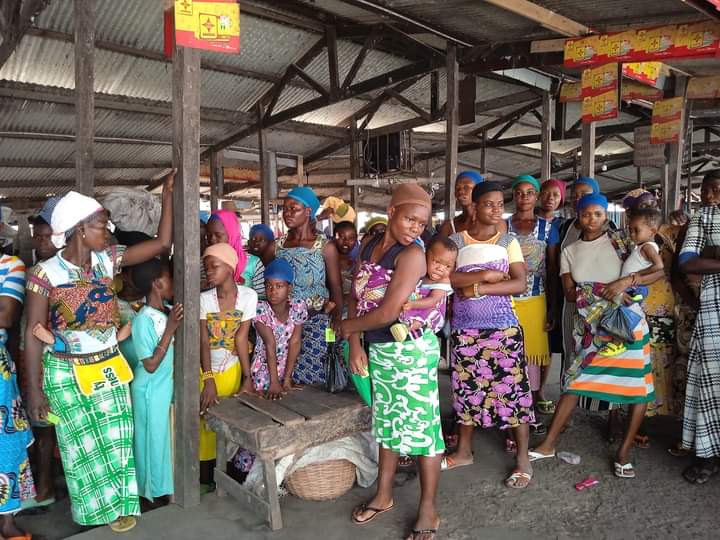The Association for the Defense of the Rights of Domestic Workers, (ADDAD), a non-profit organization has sensitized domestic workers including Kayayei and House girls about their rights as contained in Labour Domestic Workers Regulation 2020. (L.I. 2408).
Speaking at a sensitisation program held at the Malam Atta Market in Accra on Mar. 24, the Greater Accra Regional Labour Director, Mr Appiah Yeboah explained that the new law explains working hours, earnings, payment of SSNIT, leave holidays, and other employment-related regulations of the domestic worker.
He said, like any other worker, the domestic worker deserves a holiday but if the work schedule is heavy and the worker cannot go on a holiday, they have to pay them their overtime.
Mr Yeboah urged employers to be abreast with the new law and act accordingly to protect the domestic worker's rights.
He also urged all domestic workers to report cases of abuse to the Labour office or ADDAD Ghana for prompt response.

Greater Accra Regional Labour Director, Mr Appiah Yeboah speaking to the domestic workers at the Malam Attah Market
Evelyn Dumenu, Director at ADDAD Ghana said the sensitization was to help the domestic workers know their rights under the new law and urged the employers to adopt the law and treat domestic workers well.
She said the Association for the Defense of the Rights of Domestic Workers, is a non-denominational organization, initiated in 2009 and officially created in 2013 by the domestic helpers of Mali, and registered in Ghana in 2021.
“This association aims to improve domestic workers' living and working conditions and better protect them throughout their migratory journeys. ADDAD, with the idea of being an African Trade Union, spreads in the countries and it is now present in ten (10) countries of the West African sub-region (Mali, Burkina Faso, Togo, Benin, Côte d'Ivoire, Guinea-Conakry, Senegal and Gambia, Ghana, and Mauritania). The entire sub-region of ADDAD now has at least 7,000 girls and women migrants and domestic workers”, she explained.
Ms Dumenu revealed that, in recent decades, there has been a proliferation of migrations of girls and women, both within countries and across borders translating into the hiring of migrant "girls" to do domestic work.
“Around the world as well as in Ghana, the rights of domestic workers are neglected and “domestic work” has no value in the society, despite the laws and policies that govern domestic work and workers such as the ratified ILO Convention No 189, (Labour Domestic Workers Rights), Labour Act 2003, Illiteracy Protection Act, 1912, National Pensions Act, 2008, Commission on Human Rights and Administrative Justice in accordance with the Act and the Domestic Violence Act 2007, Children's Act (1998), the Juvenile Justice Act (2003), the Persons With Disability Act (2006), the Human Trafficking Act (2006), the Domestic Violence Act (2007), and the Child and Family Welfare Policy (2015)”, she added.

Some of the participants
According to the Director of ADDAD Ghana, the situation of the marginalization of domestic workers deserves reflection through deep questioning for appropriate solutions.
She said, there is a need to create awareness of domestic workers' rights to raise awareness and fight for their rights, place value on domestic work, address the injustice suffered by domestic workers and improve their living and working conditions, hence the sensitization exercise held in Accra.
“To contribute to the effectiveness of its vision, mission, and objectives, ADDAD Ghana would continue to defend the rights of domestic workers and household helpers, as well as sensitization on youth migration by drawing the attention of migrants’ girls and women on migration, in order to guide them through their migration journey”, she added.
The domestic workers after the training commended ADDAD Ghana for their commitment to defend their rights and urged other organisations to emulate them.
They also called on the government of Ghana to address the issue of climate change especially in the Northern belt of the country which is the main reason why they migrate to the south for greener pastures.
 Greater Accra Regional Labour Director, Mr Appiah Yeboah speaking to the domestic workers at the Malam Attah Market
Greater Accra Regional Labour Director, Mr Appiah Yeboah speaking to the domestic workers at the Malam Attah Market
 Some of the participants
Some of the participants


 Greater Accra Regional Labour Director, Mr Appiah Yeboah speaking to the domestic workers at the Malam Attah Market
Greater Accra Regional Labour Director, Mr Appiah Yeboah speaking to the domestic workers at the Malam Attah Market
 Some of the participants
Some of the participants